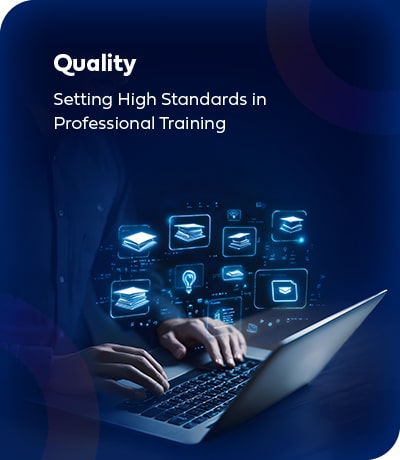
Online Course
Start learning immediately
1,038 Students enrolled
Price Match
Guarantee

3 months instalments of: £83.33

By submitting this form, you agree to e-Careers processing your data in line with our Privacy Policy
Our Sage Business Cloud Accounting course helps you add another valuable skill to your career development. This qualification is suitable for all, with no prerequisites, so if you want to gain in-demand finance skills, this Sage Accounting Software training is for you!
The Level 2 Sage Business Accounting is a short course that provides comprehensive training in Sage software, helping students gain valuable hands-on experience and navigate Sage Accounting. Completing this qualification increases your employability in finance by demonstrating your proficiency in sought-after accounting software.
Upon completing this course, you'll earn a Sage Accounting certification recognised by industry leaders, employers, businesses, and organisations worldwide. You can use the certificate in your career as a finance professional or for financial management in your business.
The Sage Certificate helps increase employability in job roles such as Finance Assistants, Accounting Clerks, Bookkeepers, and more!
Our online Sage Accounting Software course offers you the following:
Access to industry-leading eLearning platform.
Sage-approved training course materials.
Support from award-winning, industry-expert Tutors.
Free Sage Software and Xero Accounting Software.
Sage Certificate.
Sage's final online assessment is included in the course fee.
Formative and practice simulations.
A collection of digital resources.
Interactive course content.
Interest-free payment options.
Ongoing support from an accredited training provider that has trained over 630,000 students.
The Sage Accounting course covers the basic functions of accounting software, helping you accomplish fundamental accounting or bookkeeping tasks. Some of the expected learning outcomes for this level are the following:
The Sage Business Cloud Accounting workspace.
Quick entry sales and purchase invoices and payments.
Make corrections and amend transactions.
Reconcile the Bank.
Reporting.
Sage Accounting consists of 19 chapters that you need to finish before you can take the final assessment. Here's a breakdown of the chapters for this level:
Sage Business Cloud Accounting Introduction.
Registration and Sign-Up Instructions.
Screen Shots, Tasks and Activities.
Sage Business Cloud Accounting Workspace.
Setting up a New Company.
How Sage Business Cloud Accounting Works.
The Basics of Business Trading.
Creating Customer and Supplier Account Codes and Records.
Making Error Corrections and Deleting Transactions.
Customer Invoices Using Quick Entries (Batch Processing).
Customer Credit Notes Using Quick Entries (Batch Processing).
Supplier Invoices Using Quick Entries (Batch Processing).
Supplier Credit Notes Using Quick Entries (Batch Processing).
Customer and Supplier Activity.
Bank Payments and Bank Receipts.
Entering and Viewing Customer Receipts.
Entering Supplier Payments.
Bank Reconciliation.
The Trial Balance.
The Sage Accounting course consists of a series of assessments before you receive certification in each level. You will complete self-assessments, take a practice test, and sit down for your final online assessment at each level.
Your final online assessment is included in the course price and is available on-demand after you finish all chapters in each level. The assessment is computer-marked, so you can instantly get feedback and results from your exam.
What jobs can I apply for after my Sage Business Cloud Accounting Software training?
This Level 2 qualification in the Sage Business Cloud Accounting Software, provides a logical pathway to work towards a career as a Bookkeeper, using computerised accounting software. You'll be able to support your knowledge in Sage Business Cloud in a business context.
With the skills gained in this Foundation Award in Accounting Software (Level 2), new career opportunities could include:
(Source: Payscale)
If you're a business owner you will find this course beneficial, as you'll be able to keep your own books and improve the running of your business. Accountants will be able to accurately report and provide essential information to HMRC for VAT returns.
General Accounting Responsibilities & Salary
As an Accountant, you will be responsible for different areas of a company’s finances, including:
While salaries range by sector and job role, industry averages are between £20,000 and £24,000 a year at this level.
Find out more about AAT
Most comprehensive course training at the most affordable price.
Sage Payroll Certification: Receive a certificate demonstrating your mastery of Sage's accounting software.
Comprehensive eLearning platform: Access an industry-leading eLearning platform with all the support and learning materials you need and a user-friendly interface for easy navigation.
Responsive Tutor support: Request unlimited support from award-winning Tutors who aim to assist you with your learning and respond to you within 24-48 hours.
Interactive course content: Our interactive course content, consisting of engaging slides, videos, animations, and more, can help you engage better with the online Sage courses. It is available on our eLearning platform.
Formative and practice simulations: Reinforce your knowledge and gain practical experience through interactive scenarios and practice assessments that mimic real-world accounting situations.
Flexible learning: Study at your own pace as you can access the Sage qualifications in our eLearning platform for 3 months.
Free Accounting Software: Learn computerised accounting practices as we provide free accounting software such as Sage Accounting during your study of our Sage course.
Sage Certificate included: Enhance your professional credibility and earn your Sage Accounting certification as an addition to your professional toolkit.
Interest-free payment options: Our interest-free payment options make your education more accessible so you can study the course and start your learning journey without worries.
Available Sage courses: Continue your learning path with our wide range of Sage accounting courses.
What is Sage Business Cloud Accounting?
Sage Business Cloud Accounting is accounting software that offers a wide variety of features, including, but not limited to, invoicing, bill payment, cash flow tracking, expense management, time-tracking tools, and VAT compliance.
Is Sage certification worth it?
A Sage Accounting Certification provides additional skills that help you take on broader or more complex work responsibilities. It adds another competitive edge to your skill set and increases your employability, helping you stand out when applying.
Is Sage accounting hard to learn?
Depending on your previous experience and level of understanding of the concepts, sage can be relatively simple to understand, and with the right support and resources, you can easily follow along to the course and continue working towards the certification.
At e-Careers, our comprehensive Sage Business Cloud Accounting training will provide you with all the support you need for this certification.
How long does Sage Business Cloud Accounting take?
The course completion for Sage Accounting depends on various factors, such as the preferred learning style, prior knowledge in the industry, and the amount of time you can dedicate to studying each week. We offer flexibility on the course to allow our students to study at their own pace.
On average, our students typically complete their Sage training course within 3 months.
What should I do next after I have completed the Sage Business Cloud Software Course?
After completing the Sage Business Cloud Accounting Software course, you'll receive the Sage Accounting Certification, which you can use in your professional career or business.
What jobs can I apply for after my Sage Business Cloud Accounting Certification?
Some of the jobs that you can apply for with a Sage Business Cloud Accounting Certification include:
Accounts Clerk
Accounts Assistants or Accounting Clerks work for large companies, handling prime entry books and maintaining records for a single account.
Accounts Administrator
An Accounts Administrator handles data-entry tasks such as processing invoices, managing financial records, and supporting the finance team with day-to-day accounting duties.
Purchase & Sales Ledger Clerk
A Purchase and Sales Ledger Clerk records financial transactions, processes payments, and manages payable and receivable accounts.
Accounts Payable Clerk
An accounts payable clerk is essential to a company's financial team and manages the money it owes to its vendors and suppliers.







